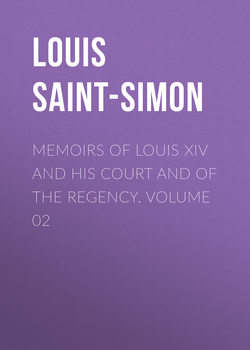Memoirs of Louis XIV and His Court and of the Regency. Volume 02

Реклама. ООО «ЛитРес», ИНН: 7719571260.
Оглавление
Louis Saint-Simon. Memoirs of Louis XIV and His Court and of the Regency. Volume 02
CHAPTER IX
CHAPTER X
CHAPTER XI
CHAPTER XII
CHAPTER XIII
CHAPTER XIV
CHAPTER XV
CHAPTER XVI
CHAPTER XVII
ETEXT EDITOR'S BOOKMARKS:
Отрывок из книги
Meanwhile our campaign upon the Rhine proceeded, and the enemy, having had all their grand projects of victory defeated by the firmness and the capacity of the Marechal de Choiseul, retired into winter-quarters, and we prepared to do the same. The month of October was almost over when Madame de Saint-Simon lost M. Fremont, father of the Marechal de Lorges. She had happily given birth to a daughter on the 8th of September. I was desirous accordingly to go to Paris, and having obtained permission from the Marechal de Choiseul, who had treated me throughout the campaign with much politeness and attention, I set out. Upon arriving at Paris I found the Court at Fontainebleau. I had arrived from the army a little before the rest, and did not wish that the King should know it without seeing me, lest he might think I had returned in secret. I hastened at once therefore to Fontainebleau, where the King received me with his usual goodness,-saying, nevertheless, that I had returned a little too early, but that it was of no consequence.
I had not long left his presence when I learned a report that made my face burn again. It was affirmed that when the King remarked upon my arriving a little early, I had replied that I preferred arriving at once to see him, as my sole mistress, than to remain some days in Paris, as did the other young men with their mistresses. I went at once to the King, who had a numerous company around him; and I openly denied what had been reported, offering a reward for the discovery of the knave who had thus calumniated me, in order that I might give him a sound thrashing. All day I sought to discover the scoundrel. My speech to the King and my choler were the topic of the day, and I was blamed for having spoken so loudly and in such terms. But of two evils I had chosen the least,—a reprimand from the King, or a few days in the Bastille; and I had avoided the greatest, which was to allow myself to be believed an infamous libeller of our young men, in order to basely and miserably curry favour at the Court. The course I took succeeded. The King said nothing of the matter, and I went upon a little journey I wished particularly to take, for reasons I will now relate.
.....
At the commencement of the next year (1697) the eldest son of the Comte d'Auvergne completed his dishonour by a duel he fought with the Chevalier de Caylus, on account of a tavern broil, and a dispute about some wenches. Caylus, who had fought well, fled from the kingdom; the other, who had used his sword like a poltroon, and had run away dismayed into the streets, was disinherited by his father, sent out of the country, and returned no more. He was in every respect a wretch, who, on account of his disgraceful adventures, was forced to allow himself to be disinherited and to take the cross of Malta; he was hanged in effigy at the Greve, to the great regret of his family, not on account of the sentence, but because, in spite of every entreaty, he had been proceeded against like the most obscure gentleman. The exile of Caylus afterwards made his fortune.
We had another instance, about this time, of the perfidy of Harlay. He had been entrusted with a valuable deposit by Ruvigny, a Huguenot officer, who, quitting France, had entered the service of the Prince of Orange, and who was, with the exception of Marshal Schomberg, the only Huguenot to whom the King offered the permission of remaining at Court with full liberty to practise his religion in secret. This, Ruvigny, like Marshal Schomberg, refused. He was, nevertheless, allowed to retain the property he possessed in France; but after his death his son, not showing himself at all grateful for this favour, the King at last confiscated the property, and publicly testified his anger. This was the moment that Harlay seized to tell the King of the deposit he had. As a recompense the King gave it to him as confiscated, and this hypocrite of justice, of virtue, of disinterestedness, and of rigorism was not ashamed to appropriate it to himself, and to close his ears and his eyes to the noise this perfidy excited.
.....